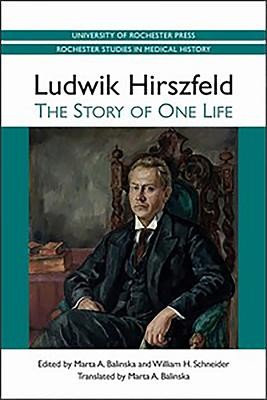
- We will send in 10–14 business days.
- Publisher: University of Rochester Press
- ISBN-10: 1580464599
- ISBN-13: 9781580464598
- Format: 14.7 x 22.4 x 2.5 cm, softcover
- Language: English
- SAVE -10% with code: EXTRA
Ludwik Hirszfeld (e-book) (used book) | bookbook.eu
Reviews
Description
An annotated English translation of the autobiography of Polish microbiologist Ludwik Hirszfeld (1884-1954), with a focus on his contributions to international public health.
Ludwik Hirszfeld (1884-1954), one of the most prominent serologists of the twentieth century, discovered the inheritance and established the nomenclature of blood groups and opened the field of human population genetics. He also carried out groundbreaking research in the genetics of disease and immunology. Following World War II, he founded Poland's first Institute of Immunology in Wroclaw, which now bears his name. His autobiographical memoir, The Story of One Life, first published in Poland in 1946, immediately became a bestseller and has been reedited several times since. It is an outstanding account of a Holocaust survivor and a writer capable of depicting the uniqueness and the tragedy of countless individuals caught up in the nightmare of 1939-45. He recollects his time as a physician in the Serbian army in 1915 and his satisfaction as a scientist who helped rebuild Poland after the Treaty ofVersailles; the contrast between the world before and the world after World War II could not be starker. Hirszfeld escaped from the Warsaw Ghetto in 1943; he hid the manuscript for this book and retrieved it only after the war.Drawing on unpublished documents, as well as interviews with Hirszfeld's former students and family, this translation is annotated and has an introduction written by two scholars with unique qualifications to understand both the immediate setting in which Hirszfeld lived his life, and the broader implications of his work to the history of medicine. Marta A. Balinska is a writer and an international consultant in public health.
William H.Schneider is Professor of History at Indiana University.
EXTRA 10 % discount with code: EXTRA
The promotion ends in 20d.03:30:52
The discount code is valid when purchasing from 10 €. Discounts do not stack.
- Publisher: University of Rochester Press
- ISBN-10: 1580464599
- ISBN-13: 9781580464598
- Format: 14.7 x 22.4 x 2.5 cm, softcover
- Language: English English
An annotated English translation of the autobiography of Polish microbiologist Ludwik Hirszfeld (1884-1954), with a focus on his contributions to international public health.
Ludwik Hirszfeld (1884-1954), one of the most prominent serologists of the twentieth century, discovered the inheritance and established the nomenclature of blood groups and opened the field of human population genetics. He also carried out groundbreaking research in the genetics of disease and immunology. Following World War II, he founded Poland's first Institute of Immunology in Wroclaw, which now bears his name. His autobiographical memoir, The Story of One Life, first published in Poland in 1946, immediately became a bestseller and has been reedited several times since. It is an outstanding account of a Holocaust survivor and a writer capable of depicting the uniqueness and the tragedy of countless individuals caught up in the nightmare of 1939-45. He recollects his time as a physician in the Serbian army in 1915 and his satisfaction as a scientist who helped rebuild Poland after the Treaty ofVersailles; the contrast between the world before and the world after World War II could not be starker. Hirszfeld escaped from the Warsaw Ghetto in 1943; he hid the manuscript for this book and retrieved it only after the war.Drawing on unpublished documents, as well as interviews with Hirszfeld's former students and family, this translation is annotated and has an introduction written by two scholars with unique qualifications to understand both the immediate setting in which Hirszfeld lived his life, and the broader implications of his work to the history of medicine. Marta A. Balinska is a writer and an international consultant in public health.
William H.Schneider is Professor of History at Indiana University.


Reviews